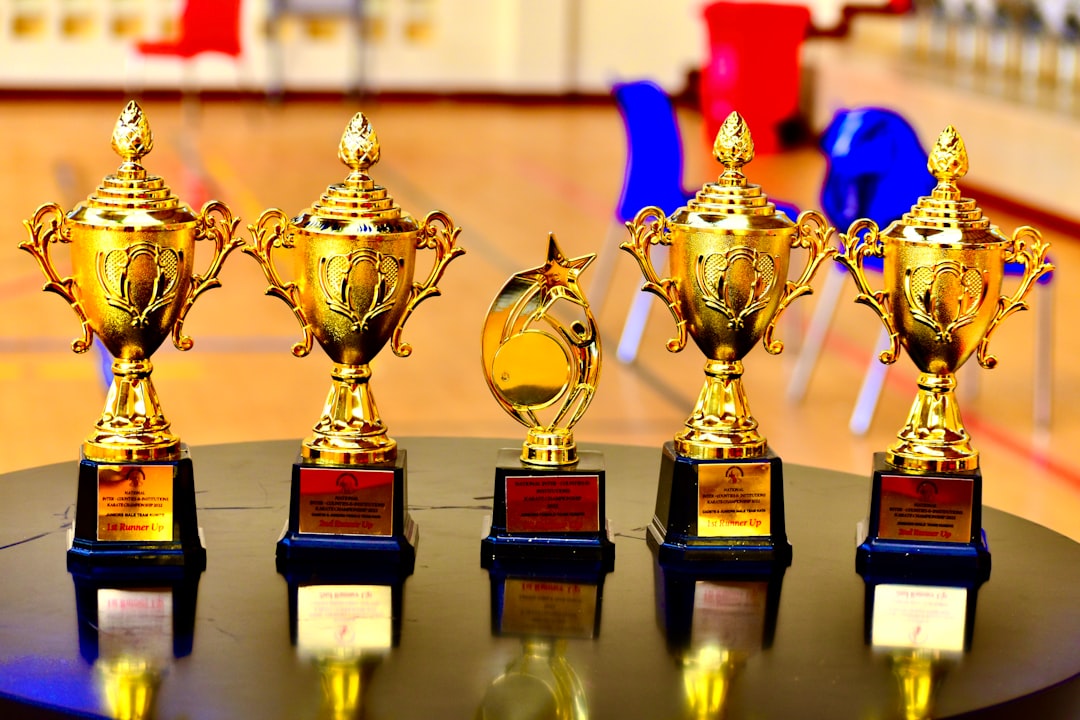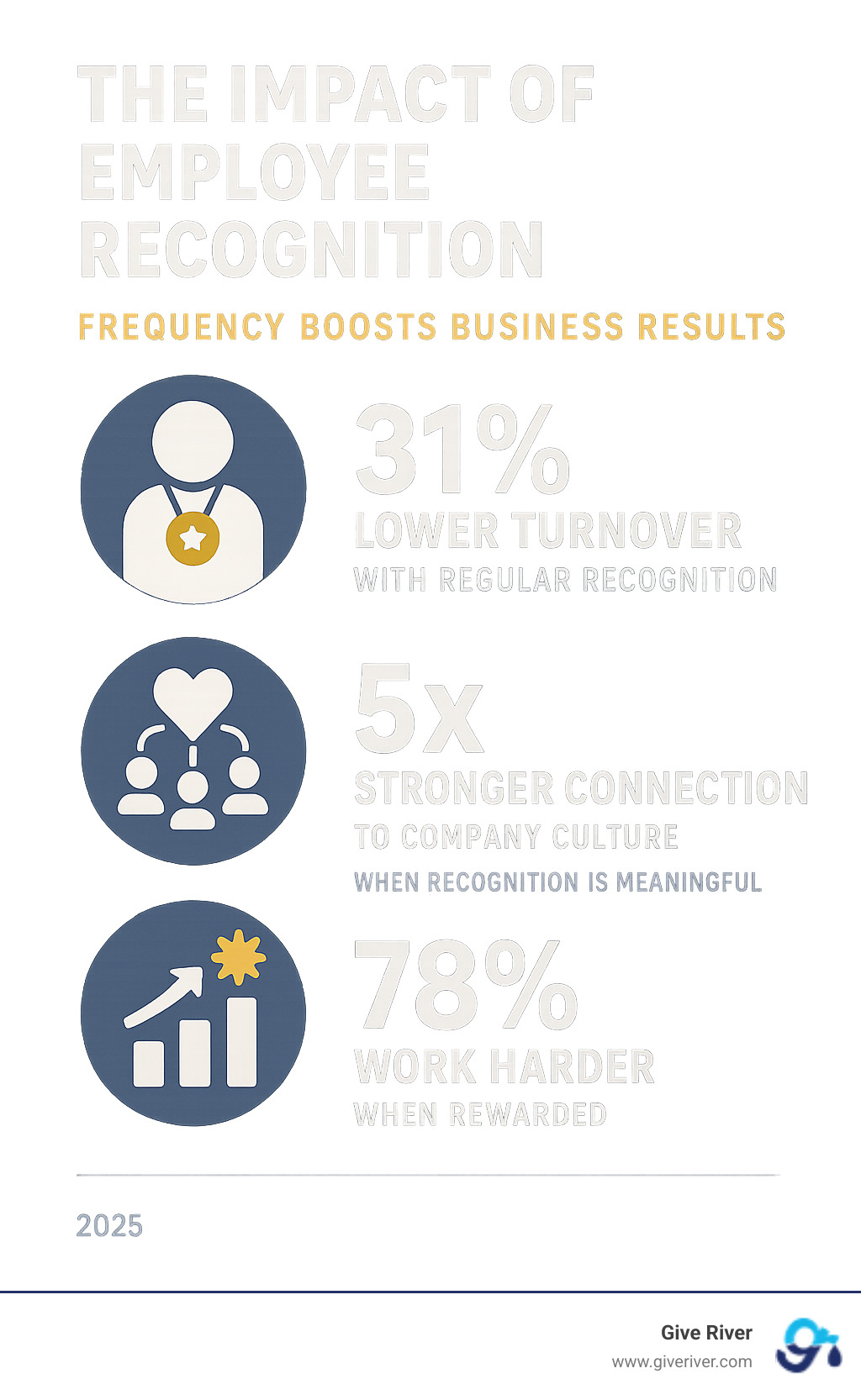Corporate Recognition Awards Made Easy: Boost Morale and Productivity
Boost morale & productivity! Learn to design effective corporate recognition award programs to engage employees & reduce turnover.

Why Your Best People Are Quietly Looking for the Exit
The numbers tell a stark story: 79% of people quit their jobs because of a lack of appreciation. With 85% of employees not engaged at work, the cost of inaction is immense. Your top performers aren't just looking for bigger paychecks; they're seeking meaningful acknowledgment. Without it, they're already mentally checking out or actively interviewing elsewhere.
The good news? Companies with strong recognition programs see 31% lower voluntary turnover. The solution is creating systematic ways to show people their work matters.
I'm Meghan Calhoun, and after two decades in high-pressure environments, I've learned that sustainable success comes from creating meaning at work. Through my work co-founding Give River, I've seen how well-designed corporate recognition award programs can transform company culture and drive measurable business results.

What is a Corporate Recognition Award Program?
A corporate recognition award program is a structured initiative designed to appreciate and motivate employees. It goes beyond a simple "thank you" by creating a system to consistently acknowledge efforts, behaviors, and achievements that align with your organization's goals. These programs are strategic tools aimed at creating a positive work environment that boosts morale and productivity.
Think of it as a positive feedback loop. When employees know their hard work will be seen and valued, they're more inclined to bring their A-game. It's about turning appreciation into an actionable, measurable part of your company culture.
The Undeniable "Why": The Business Case for Recognition and Appreciation
Corporate recognition award programs aren't just a feel-good initiative; they're a strategic necessity that directly impacts your bottom line. When your best people feel invisible, they plan their escape. When they feel valued, they become your biggest advocates. The power of gratitude in the workplace creates measurable business results.
Scientific research—such as this Harvard Business Review analysis on why recognition fuels motivation—consistently shows that when people feel valued, they don't just perform better; they transform entire teams. At Give River, we've seen this change happen countless times.
Boost Engagement and Productivity
Recognition is the antidote to the engagement crisis. When employees receive meaningful recognition, they're 4 times more likely to be engaged, which translates to a 31% increase in productivity. Furthermore, 78% of workers say they work harder when their efforts are recognized, leading to 14% better performance across the board.
Our employee engagement and recognition solution is built on this truth: when people feel seen, they contribute more. It's about creating conditions where people thrive.
Drastically Improve Employee Retention
Improving retention can save a 10,000-employee company up to $16.1 million annually. Organizations with strong recognition programs see 31% lower voluntary turnover. Recognized employees are also 56% less likely to seek other job opportunities. In today's competitive talent market, recognition is your secret weapon for keeping top talent engaged and combating the disengagement that leads to quiet quitting.
Our work anniversary awards approach helps you celebrate important milestones and reinforce long-term commitment.
Build a Magnetic Company Culture

Culture is how people feel at work. When recognition is woven into your culture, employees are 5 times more likely to feel connected to your organization's values. This matters, as 77% of job seekers consider company culture before applying. Recognition programs foster psychological safety, creating an environment where people feel comfortable sharing ideas. This leads to a 2.5 times increase in collaboration, strengthening your entire organization.
Our approach to building the best total rewards package integrates recognition seamlessly into your organizational identity.
Support Employee Wellness and Mental Health
Well-designed corporate recognition award programs are wellness programs in disguise. Employees in strong recognition cultures are 82% happier, which translates to better mental health. With 92% of employees facing mental health challenges that impact their work, recognition creates a buffer against burnout by helping people feel valued and connected. When people feel appreciated, they have stronger relationships, more purpose, and are less likely to experience isolation.
Our workplace rewards ideas often integrate wellness, recognizing that true fulfillment comes from feeling valued holistically.
The "What": A Blueprint of Modern Recognition Types and Categories

There are no "one size fits all" corporate recognition award programs. The magic happens when you create a diverse recognition ecosystem that connects with people in ways that resonate. The most successful programs understand this diversity and create multiple pathways for appreciation, spanning formal and informal methods, monetary and non-monetary rewards, and both individual and team achievements.
Key Categories for Corporate Recognition Award Programs
Effective recognition programs are built on five essential categories:
- Peer-to-Peer Recognition: When colleagues recognize each other, it builds genuine camaraderie. For 28% of employees, peer feedback has the most impact.
- Top-Down Recognition: Acknowledgment from managers and leaders reinforces company values and shows that leadership is paying attention.
- Milestone Awards: These celebrate work anniversaries, promotions, or project completions, acknowledging an employee's journey and commitment. Our work anniversary awards show how to make these moments meaningful.
- Performance-Based Awards: Tying recognition to specific achievements creates a clear link between effort and appreciation.
- Values-Based Recognition: This is the most culture-shaping category, celebrating employees who embody your company's core values.
You can see how these categories work together in our employee recognition examples.
Monetary vs. Non-Monetary Rewards
Both monetary and non-monetary rewards have their place. The key is a balanced approach that maximizes impact.
Monetary rewards like bonuses, gift cards, and profit-sharing provide tangible value. They're effective for performance-based recognition and milestones.
Non-monetary rewards often create deeper impact. These include public shout-outs, thank-you notes, extra PTO, flexible hours, and professional development. In fact, 47% of employees find new growth opportunities more rewarding than monetary compensation.
Experiential rewards like a weekend getaway create lasting memories and deepen emotional connections to your company, extending the impact of recognition.
Our employee rewards solutions offer a diverse catalog to cater to every preference.
The Rise of Peer-to-Peer Recognition
Peer-to-peer recognition is a powerful trend. Appreciation from a colleague builds immense camaraderie and trust because it's authentic and immediate. The numbers are compelling: 90% of workers noted that values-based, peer-to-peer recognition made them more satisfied with their work. This transforms recognition from a top-down mandate into a living part of your daily operations.
Our peer-to-peer recognition activities are designed to facilitate this organic appreciation, making it easy for employees to recognize each other meaningfully.
The "How": Designing Successful Corporate Recognition Award Programs from Scratch

Building a successful corporate recognition award program requires thoughtful planning and commitment. Most programs fail not because of bad intentions, but poor execution. The difference between programs that thrive and those that die lies in the foundation you build.
Step 1: Define Clear Objectives and Get Leadership Buy-In
First, answer: What are you trying to achieve? Are you fighting retention issues, boosting engagement, or reinforcing company values? Your objectives will shape every decision. Aim for measurable business results, like improving retention by 15% or boosting your eNPS score.
Once your objectives are clear, get leadership buy-in. Your program will not succeed if executives see it as just another HR checkbox. Present the data showing how recognition drives engagement, reduces turnover, and boosts productivity. When leaders commit, they set the tone for the entire organization.
Step 2: Establish a Budget and Recognition Criteria
A program needs a proper budget. Companies seeing the greatest impact typically budget around $200-$350 per employee per year. This covers both program platform fees and the rewards themselves.
Even more important than the budget is fair criteria. Nothing kills a program faster than the perception of favoritism. You need transparent guidelines that clearly spell out what behaviors and achievements earn recognition. Whether it's hitting sales targets or embodying company values, make the criteria objective and accessible to everyone. Our insights on corporate rewards programs emphasize this balance.
Step 3: Involve Employees and Personalize the Program
The most successful programs are built with employee feedback. Run surveys, hold focus groups, and ask people what recognition is meaningful to them. You might be surprised by the diversity of preferences.
The key is personalization. Your workforce is diverse, so their recognition preferences are too. Offer choice in rewards and recognition methods, letting people select from options that resonate with their personal values. This approach promotes inclusivity and ensures everyone feels valued in a meaningful way.
Our configurable employee recognition solutions are designed with this personalization in mind.
Step 4: Communicate, Launch, and Educate
A strong launch can make or break your program. Build excitement with a campaign that explains the what, why, and how. Use multiple channels like team meetings, newsletters, and digital displays.
The crucial part is to train managers. They are your frontline leaders who will drive usage. Make it clear why recognition matters and how to give it effectively: frequently, specifically, and genuinely. Finally, educate employees on how to participate. The simpler the process, the more successful your recognition programs for employees will be.
Level Up Your Program: Measurement, Technology, and Future Trends
Once your corporate recognition award program is running, the work of tending to it begins. The most successful programs are those that continuously evolve based on data and emerging trends.
Measuring the ROI of Your Corporate Recognition Award Programs
To prove your program is working, track the metrics that matter. 74% of HR leaders use recognition data to hit performance goals. Keep an eye on employee engagement scores (eNPS), voluntary turnover rates, and productivity metrics. Compare these numbers before and after implementation.
Programs that measure outcomes like well-being and belonging are 68% more likely to drive business results. When you can show that recognition is tied to reduced turnover or increased productivity, you have a compelling case for continued investment. This data-driven approach transforms your program into a strategic business tool. Our insights on performance appraisal and rewards can help connect recognition to measurable outcomes.
Choosing the Right Employee Recognition Platform

An employee recognition platform is your digital conductor, creating harmony across your organization, which is especially crucial in remote and hybrid environments. When evaluating options, focus on scalability, user experience, and integrations with existing tools like HRIS, Slack, or Microsoft Teams. While many platforms like Bonusly or Kudos excel at social, peer-to-peer recognition, a truly comprehensive solution also integrates support for employee wellness, growth, and community impact.
Analytics and reporting show you what's working, and mobile access is essential for on-the-go recognition. The best platforms include features like peer-to-peer feeds, points and rewards catalogs, milestone automation, analytics dashboards, and mobile apps. Our employee recognition platforms guide dives deeper into what to look for.
Emerging Trends in Employee Recognition
The world of work is evolving, and recognition programs must keep pace. Here are key trends shaping the future:
- Holistic wellness integration: Offering wellness days, fitness memberships, and mental health resources.
- Gamification: Using points, badges, and leaderboards to make recognition more engaging. Our gamification in the workplace strategies tap into this.
- AI-powered suggestions: Using AI to analyze patterns and suggest timely recognition opportunities.
- Hyper-personalization: Moving from generic rewards to customized experiences that resonate with individuals.
- Integration of social impact: Allowing employees to donate recognition points to charities, aligning with Give River's unique approach.
These trends highlight a shift toward more meaningful, personalized, and integrated recognition. Keep an eye on our recognition & rewards blog category for the latest insights.
Frequently Asked Questions about Recognition Programs
How often should you give recognition?
Recognition should be frequent and timely to be effective. While formal awards might be monthly or quarterly, informal praise should happen constantly, like a steady heartbeat for your culture.
Data shows that increasing recognition from quarterly to monthly boosts engagement by 40% and job commitment by 25%. A good rule of thumb is to mix daily informal praise with monthly or quarterly formal awards to ensure a continuous flow of appreciation.
Should awards be monetary or non-monetary?
The best approach is a mix of both, as they serve different purposes in corporate recognition award programs. Non-monetary awards like public praise or growth opportunities often create lasting emotional impact. In fact, 47% of employees find new growth opportunities more rewarding than monetary compensation.
However, monetary rewards provide tangible motivation, especially for performance-based recognition. The key is offering choice and understanding what your employees value most, which can be finded through feedback.
How do you make a recognition program fair and inclusive?
Fairness and inclusivity are paramount. Nothing kills a program faster than perceived favoritism.
- Establish clear, objective criteria and communicate them widely so everyone understands how to earn recognition.
- Use a diverse panel for judging nominations to mitigate unconscious bias and ensure various contributions are seen.
- Implement peer nominations to uncover unsung heroes from all levels of the organization.
- Ensure remote and offline workers have equal access and opportunity for recognition through technology or physical systems.
- Maintain consistency in applying criteria and use regular feedback loops to ensure the program serves everyone on your team.
Conclusion: Transform Your Culture from Appreciation to Fulfillment
The evidence is clear: corporate recognition award programs are powerful strategic tools. When you invest in recognition, you're not just making people feel good—you're driving business results through higher engagement, better retention, and a stronger culture.
The difference between a program that fizzles out and one that transforms your workplace is moving beyond simple appreciation to create genuine fulfillment. It's about building a culture where every person feels valued, seen, and connected to something bigger than themselves.
While platforms like Bonusly and Kudos have mastered social, peer-to-peer recognition, Give River's unique approach goes further by integrating recognition, guidance, wellness and growth content, gamification, and community impact. This approach doesn't just acknowledge what people do—it helps them grow and connects them to purpose.
Recognition is most powerful when woven into the fabric of your team's operations. When appreciation flows naturally and connects to your company's mission, you create a workplace where people thrive.
Ready to open up your team's full potential and build a culture of fulfillment? Let us help you start building a culture of fulfillment with a powerful recognition platform that makes every contribution count.




